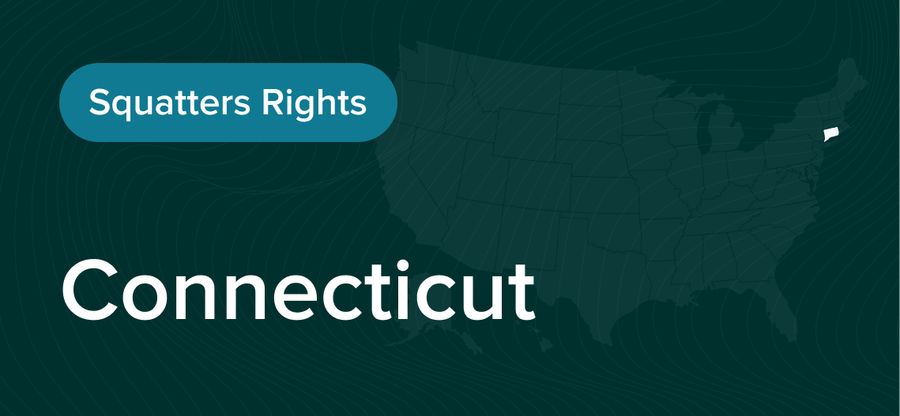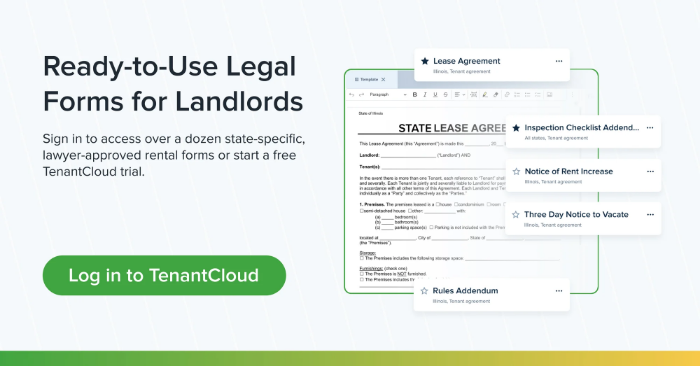Do you have squatters in your Connecticut property? What legal rights do you have as a landlord? Navigating landlord-tenant laws can be complex; however, squatters’ rights are in a league of their own. Squatters’ rights differ in each state, making it important to understand what legal rights both you and squatters retain.

In this blog, we’ll break down Connecticut squatters’ rights laws, including the requirements for an adverse possession claim, how to prevent adverse possession, and the steps you need to take if you have squatters on your Connecticut property.
What are the Legal Differences Between a Squatter and a Tenant in Connecticut?
The main difference between squatters and tenants is the right to occupy a property. Tenants have the legal right to occupy a rental property for a designated time period under state law, such as through a rental agreement. On the other hand, squatters have no legal agreement with the landlord to occupy the property. Moreover, tenants pay rent at a set amount, while squatters do not.
What are Connecticut Squatters’ Rights Laws?
Connecticut squatters’ rights laws, known as adverse possession, give squatters a legal claim to gain ownership of a property that they have occupied for a statutory period. In Connecticut, a squatter obtains adverse possession of a property after 15 years of occupancy. However, there are specific requirements that must be met to gain legal ownership, including:
- Actual Possession – The squatter must physically live on the piece of real estate for the entire 15 years. Visiting and storing items does not qualify as actual possession.
- Open and Notorious Possession – The squatter must make their occupancy known to the legal owner and the community. Hiding occupancy does not meet the requirements.
- Exclusive Possession – The squatter must occupy the property exclusively and without permission from the legal owner. Co-sharing a property would not qualify.
- Continuous Possession – The squatter must reside in the property for 15 continuous years to have the right to adverse possession. Any gap breaks the continuous ownership requirement.
- Hostile Possession – The squatter must occupy the property without the permission of the owner or property management company.
In addition to the above possession requirements, squatters must pay property tax on the piece of real estate, make visible improvements, and act like the property owner to have an adverse possession claim.
Related: Connecticut State Evictions | Laws and Protections
How Long Until Squatters Can Claim Adverse Possession in Connecticut?
One of the main requirements for an adverse possession claim under Connecticut law is 15 years of continuous occupancy. This means that the squatter has occupied the property for 15 consecutive years without permission from the Connecticut property owner or a property management company. Connecticut general statutes are very strict with this requirement. Even a temporary absence could cause the 15-year period to be reset.
Let’s say that you have a squatter who has occupied the property for 12 years. They decide to travel in an RV for six months. This short absence would cause the 15-year holding period to restart, eliminating any adverse possession law claim. The long occupancy period is designed to protect Connecticut landlords and property owners from losing their real estate to adverse possession claims.
What Protections Do Squatters Have in Connecticut?
Outside of adverse possession, Connecticut squatters’ rights laws are minimal. Unlike tenants with a lease agreement, squatters are not given access to basic necessities. Here are the rights that squatters do not have:
No Right to Utilities
For one, squatters have no rights to utilities. You aren’t required to run basic utilities, like water, electricity, gas, or sewage services, to the property because someone is occupying it.
No Right to Repairs
Squatters have no right to request repairs or improvements to the rental property. They also cannot make their own improvements or repairs. Squatters are considered trespassers and have no property rights.
No Rights to Occupy the Property
Since squatters have no rights to occupy the property, such as through a lease agreement, they can’t claim the right to occupy the property without your permission. Connecticut property owners can take legal action to have the squatters removed by filing an eviction lawsuit and securing a court order. Once these items are filed, the police can remove the squatters from the property if they do not leave voluntarily.
What Rights Do Tenants Accused of Being Squatters Have?
Tenants accused of being squatters have a different set of legal rights in Connecticut. Landlord-tenant laws are put in place to protect tenants’ rights even though they might be violating their rental agreement. The Connecticut Fair Housing Center handles tenant rights. Here are the rights tenants have in Connecticut:
Right to Remain on the Property
The first landlord-tenant law is the right to remain on the property. Property owners and managers have no legal right to remove or lock the tenant out of the rental property. If the tenant is lawfully occupying the property, meaning they had a rental agreement or lease in place, they cannot be removed, even if the landlord believes they are trespassing.
Right to Advance Notice
Tenants also have the right to receive advance notice of an eviction. In Connecticut, landlords must give tenants a Notice to Quit, which gives the tenants a three-day notice before the eviction process starts. In some situations, this gives the tenant a short amount of time to catch up on late payments or become re-compliant.
Right to Contest Eviction
The Connecticut judicial branch requires landlords to prove that the tenants are not potential squatters. Tenants also have the right to appear in court and explain why they are legal tenants.
Right to Utilities
Unlike squatters, tenants cannot have their utilities shut off, even for lease violations. Property owners must go through the eviction process before they can shut off utilities and remove the tenant.
Tenants who are mistaken for squatters can sue the landlord for illegal evictions and recover damages. The tenant may also be able to move back into the residential property. It’s also important to understand that holdover tenants have these rights as well. Holdover tenants are occupants who continue to pay rent after the lease expires.
Related: New York Squatter's Rights | Laws and Protections
Are Landlords Responsible for Squatter Damages?
Responsibility for damages depends on legal ownership. Landlords with property ownership are generally liable for squatter damages. Landlords can take legal action against squatters for the cost of repairs or remediation. However, the squatter must have assets or wages that can be garnished to recoup funds. It’s very difficult to recoup funds from squatters with no monetary resources. Remember, if you are putting a tenant in your property, collecting a security deposit can help cover any damages.
What Steps Can You Take to Prevent Squatters from Taking Over Your Property in Connecticut?
There are steps you can take to protect your real estate portfolio from squatters. Here are four different ways to avoid an adverse possession claim and squatters on your real estate property:
Rent Property
One of the best ways to prevent squatters from taking over your property is to rent out the property. Tenants with a legal right to occupy the property make it harder for squatters to make an ownership claim. However, before you let another tenant in, check past eviction records. If the tenant has a record of evictions, you might not want to rent to them.
Secure the Property
Ensuring all doors and windows are locked can prevent unwanted squatters. Property owners can also consider installing gates, fences, and other barriers to restrict access to the property.
Post No Trespassing Signs
No trespassing signs make it clear that the property is private and not available to the public. Post these signs around your property’s perimeter.
Regularly Visit
Regularly visiting your property is important to quickly catch squatters. If you don’t have the time to visit each of your properties, consider hiring a property manager.
How to Evict a Squatter in Connecticut
Connecticut squatters’ rights laws are specific on the legal proceedings that property owners must take. Here’s the typical process for evicting squatters and reclaiming your ownership according to Connecticut laws:
- Serve Notice to Quit – The notice to quit gives the squatter 30 days to voluntarily vacate the property. After the 30-day period expires, the eviction proceedings will begin. The notice must be served according to the Connecticut judicial branch, including listing at least one reason for eviction and providing enough copies for each adult you want to evict.
- File Eviction – If the squatters don’t voluntarily leave, you will need to file an eviction lawsuit in the housing court.
- Obtain Court Order – A judge will review your eviction case and approve or deny it. If approved, the squatters will need to move off your property by a certain time.
- Sheriff Removal – If the squatters do not comply with the court order, the sheriff can forcibly remove them.
The entire eviction process can take two to three months, assuming no significant delays.
Related: Massachusetts Evictions | Laws and Protections
Summary
Navigating Connecticut squatters’ rights laws can seem confusing, especially when differentiating between a tenant with a lease violation and a squatter. If you need more assistance navigating squatter rights in Connecticut, reach out to a lawyer who can provide you with legal advice and legal assistance tailored to your situation.
___________________________________________________________________________
Disclaimer: TenantCloud does not provide legal advice. This content is for informational purposes only and should not be considered legal guidance. Users are responsible for reviewing all applicable local, state, and federal laws and consulting a qualified attorney with any legal questions.
___________________________________________________________________________






